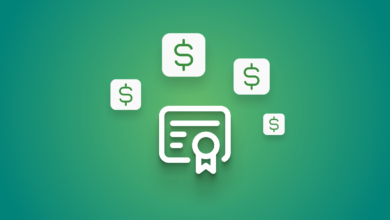How to become a life coach online: 5 steps to success 2025

Almost certainly you are reading this because you’re interested in pursuing a life coaching career online. And why wouldn’t you? It’s a gratifying full-time career that allows you to help people achieve their goals and reach their potential. Plus, with the rise of online life coaching, it’s now easier than ever to get started.
Life coaches have never been more in demand. The life coaching industry’s market value exceeds $15 billion and is expected to reach nearly $20 billion next year. With the average annual growth rate at just under 6%, there’s no better time to become a certified life coach than now!
Most life coach practitioners most frequently engage with their clients in person, yet online platforms for coaching have doubled in the past four years, from 24% in 2015 to 48% in 2019.
If you’re wondering how to become a certified life coach, you’re at the right place.
In this article, we’ll show you how to become a life coach online in 5 straightforward steps. We’ll also share some valuable tips for success along the way. So whether you’re just getting started or looking to take your coaching business to the next level, read on!
What is life coaching?
Let’s begin with the basics. To be on the same page, let’s define ‘life coaching’, and then the role of a life coach, and what it entails.
In its broader term, ‘coaching’ refers to training or teaching someone. This may describe a coach training a high school soccer or gymnastics team, but a life coach is not limited to that.
Life coaching (or virtual life coaching) is a professional relationship and process aimed at helping individuals achieve personal or professional goals, improve specific areas of their lives, or unlock their full potential.
A life coach is a professional who acts as a guide, motivator, and accountability partner and strives to improve other people’s lives by helping them focus on what matters to them the most. Life coaches help people in goal setting, completing short- and long-term goals, identifying obstacles, and making informed decisions to reach growth and development in various aspects of their lives.
Coaching is not therapy, but it can be therapeutic. In a broader sense, therapy treats a loss, a void, emotional trauma, or even illness. The goal of therapy is to heal a past event, such as to treat a disorder (e.g., bipolar disorder); that is not coaching, nor life or health coaching.
What credentials do you need to be a life coach?
A life coach may support a person or a team going through difficult life situations, and their job is to foresee the challenges and be quick enough to change circumstances to protect their coaching clients.
A life coach helps others become the best version of themselves. They are a supporter, a trainer, an educator, a teacher, a leader; their purpose is to get their coaching clients back on track whenever they stumble in life and to help with specific projects, personal goals, and transitions.
To become a life coach, there are no strict legal requirements, but professional credentials can enhance credibility:
Education: No degree required, but psychology, counseling, or business backgrounds help.
Certification: Recommended certifications are ICF Certification (most recognized) with ACC, PCC, and MCC levels, and BCC (Board Certified Coach) from the Center for Credentialing & Education. Other options include taking life coach courses online that specialize in online life coach certification (like IAC).
Experience: Gain practical coaching hours (e.g., 100–500+ for ICF).
Skills: Develop active listening, empathy, communication, and goal-setting skills.
Business acumen: Learn marketing, branding, and networking to attract clients.
Through a life coach training course, a life coach may focus on helping people grow by identifying limiting beliefs, challenges, and obstacles and developing a customized and actionable plan to achieve specific life outcomes.
Unlike a mentor or a therapist, a life coach searches for unseen potential in people and looks at the here and now to help them make solid plans, follow them, and develop as individuals.
P.S.: Read the differences between coaching vs. mentoring.
Although they serve many roles, life coaches are not therapists, psychologists, or psychiatrists. Their training includes asking questions and helping clients examine their mindset and overcome obstacles, but they don’t have credentials nor are certified to treat mental health issues such as depression or severe anxiety.
Life coaching vs. personal development coaching vs. business coaching
Life coaching: is about more than just work. It includes everything from family and personal goals to dealing with bad habits or stress in a person’s life. All are seen through the lens of an entire person looking at their holistic picture. So, instead of focusing on only core competencies that might be causing a person distress, life coaching attempts to understand how those things connect in a person’s life as part of being “fully alive.”
Personal coaching: largely resembles life coaching. It’s an empathetic process that helps people improve their work environments and themselves. It provides a sounding board for introspective empathy-based feedback on how a person can reach progress in all aspects of personal development, not just those related to business or finance, but also spiritual concerns.
Business coaching: is designed to help the person achieve more at work. It addresses peer relationships or communication in a business environment, assisting people in advancing their careers and understanding how they can add value to a company by utilizing their skills. Executive coaches (also known as career coaches) focus on managing managers’ jobs better to satisfy employees. They also work on reducing stress levels which results in improved job performance overall – this type of service focuses heavily on client-coach relationships.
5 steps to become a life coach online
All of this information sounds good in theory. But what does it take to become a great life coach in real life and succeed in online life coach training? Do you need to take life coach classes, or is it enough if you’re “good with people”?
Let’s find out using the following step-by-step guide:
Step
Description
1. Find your coaching niche
Choose a niche that aligns with your skills, knowledge, and interests. Examples include personal coaching, career coaching, business coaching, or fitness coaching. Specializing in a niche helps you stand out and attract the right audience.
2. Get a life coach certification
While not mandatory, certification from a reputable body like the ICF can enhance credibility and ensure you meet ethical and professional standards. Training programs help you develop critical coaching skills like active listening, goal-setting, and decision-making.
3. Start your life coach business
Treat your coaching practice as a business. Register your business, calculate costs, and create a plan for managing operations. Consider digital tools like Zoom or online platforms to minimize costs and offer flexible services. Invest in coaching insurance for added security.
4. Choose an online training platform
Select a platform like LearnWorlds to host your coaching programs. Look for features like customizable templates, branding options, and the ability to manage clients and track progress efficiently.
5. Build your training program
Create a structured program tailored to your niche and audience. Include clear objectives, practical exercises, and interactive content to engage clients and help them achieve their goals effectively.
Step & Description
1. Find your coaching niche
Choose a niche that aligns with your skills, knowledge, and interests. Examples include personal coaching, career coaching, business coaching, or fitness coaching. Specializing in a niche helps you stand out and attract the right audience.
2. Get a life coach certification
While not mandatory, certification from a reputable body like the ICF can enhance credibility and ensure you meet ethical and professional standards. Training programs help you develop critical coaching skills like active listening, goal-setting, and decision-making.
3. Start your life coach business
Treat your coaching practice as a business. Register your business, calculate costs, and create a plan for managing operations. Consider digital tools like Zoom or online platforms to minimize costs and offer flexible services. Invest in coaching insurance for added security.
4. Choose an online training platform
Select a platform like LearnWorlds to host your coaching programs. Look for features like customizable templates, branding options, and the ability to manage clients and track progress efficiently.
5. Build your training program
Create a structured program tailored to your niche and audience. Include clear objectives, practical exercises, and interactive content to engage clients and help them achieve their goals effectively.
Step #1: Find your coaching niche
Before you are ready to commit to being a life coach, you first need to choose your niche. Usually, you go by the one in which you are good, have previous coaching experience, or have certain knowledge about.
There are many examples of life coaches, each one specializing in a different niche category:
Personal coach: a coach that helps individuals achieve goals in any aspect of personal development including relationships, wellness, or health.
Career coach: a coach that helps individuals make informed decisions regarding their career development and professional progress.
Spiritual coach: a coach that helps individuals connect with whom they are using a deeper, holistic approach to free them from limiting beliefs.
Business coach: a coach who helps business owners guide their business by clarifying business goals and balancing them with their personal goals.
Fitness coach: a coach/trainer who helps individuals achieve their fitness goals by providing constructive feedback and goal motivation.
Financial coach: a coach who helps individuals achieve financial goals by monitoring and encouraging positive financial behaviors.
Sometimes a life coach can be a combination of two or more of that, but you usually need to have expertise and life coaching skills in the area or certification to make yourself qualified for it.
Step #2: Get a life coach certification
As previously mentioned, it is not compulsory to get certified to become a professional life coach. However, a recent ICF (International Coach Federation) report shows that almost 99 percent of life coaches undergo life coach training approved by a professional organization before they begin the coaching practice. So how can you get your online life coach certification?
If you want to get accredited in the coaching industry, you need to make sure your certification meets the requirements of the ICF accrediting body, which sets the standards of ethical coaching.
To become a certified coach you will need to choose a training program in life coaching or in a specialty area that fits your coaching goals. You can get your life coach certification online, in person, or with a combination of the two – whatever suits you best.
Also, you need to choose the one that helps you develop the skills every life coach needs to possess, including:
Active listening
Communication ability
Leadership/Confidence
Progress management
People skills
Coaching skills
Decision-making
Problem-solving
Creativity
Goal-setting
Accountability
For that to happen, you will need to complete the dedicated amount of hours of training and learn more about the business of becoming a life coach, because becoming a successful life coach is a business on its own.
To search for a life coach certification program, whether you’re interested in getting a life coaching certification online, in-person, or hybrid, click here.
To search for a life coach certification program click here.
Step #3: Start your life coach business
As a coach, you don’t have a product to sell. That is true. However, once you become a life coach, you automatically become a business owner. You become the ‘product’.
In the life coaching business, you are offering your time and yourself and there are some things you need to do to ensure that it thrives.
Register your business
Choose a name for your business and register your business with your state or the responsible body in your country.
If you are choosing your business type to be a sole proprietorship – which is the simplest type of business to set up, your business doesn’t require registration. But if you are choosing another business entity type e.g. LLC, partnership, or corporation amongst others, registration is mandatory.
Calculate the costs
Are you planning to meet people in person or through online means?
Becoming a life coach doesn’t have any upfront costs unless you are renting or buying an office for it. Meeting people in person will add to the costs considering that you will need a meeting place.
The digital age allows for 1:1 coaching sessions through online webinars and live classes, Zoom or Skype, which are less expensive and more convenient to use. This can be part of an online program that will allow you to offer your coaching services.
If you are low on budget, consider how much it will cost you to create your coaching program through an online business.
Also, think about coaching insurance, which may come in handy if people are suing you over bad or inaccurate advice.
To get a total of what you will need to pay, it might help to create a business plan to calculate your costs.
Invest in marketing
As a new coach, there are many marketing strategies you can put together in a solid marketing plan and implement them to reach out to potential clients.
Out of the best things you can do is invest in personal branding and electronic word of mouth. Don’t forget, recommendations haven’t gone out of fashion. On the contrary, they are the safest bet.
On top of that, you need to strengthen your online presence and add more credibility. To make sure you are effective, you will also need to do the following:
Build a website: a professional website can establish you as an expert in your field as it can give you authority. Your site should act as a directory where people can find out more about who you are and what you do.
Take for instance a great life coach example built with LearnWorlds – Be A Better Human and build on your coach-building and promotional activity.
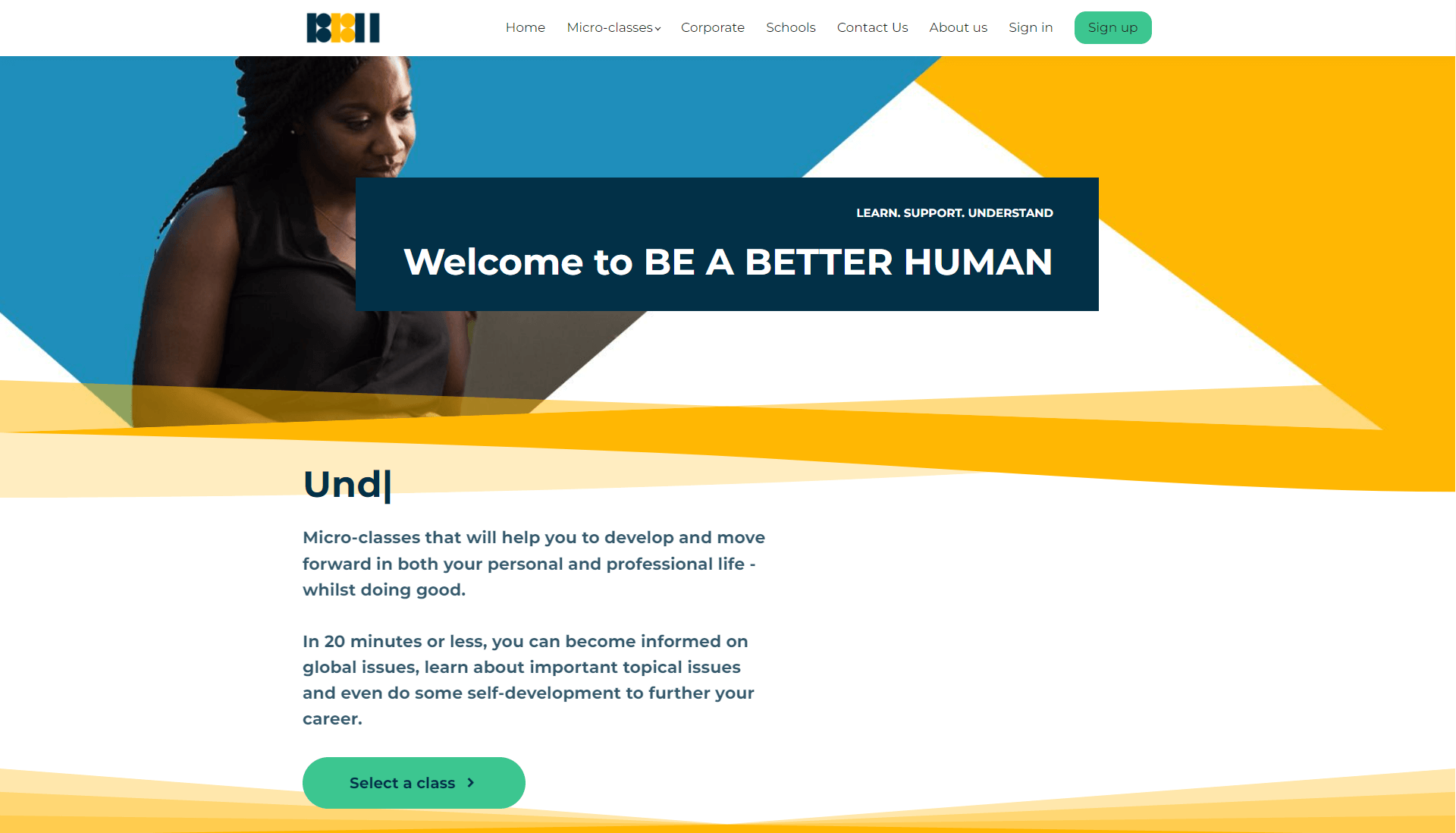 An example of a successful website from Be A Better Human.
An example of a successful website from Be A Better Human.
Create a strong online presence: create your social media profiles (Instagram, Twitter, and Facebook) and post consistently using tools like Hootsuite. Introduce yourself as a life coach on LinkedIn – which is the top professional platform and the place where people are most likely to find you and make sure that your profile(s) appear on Google.
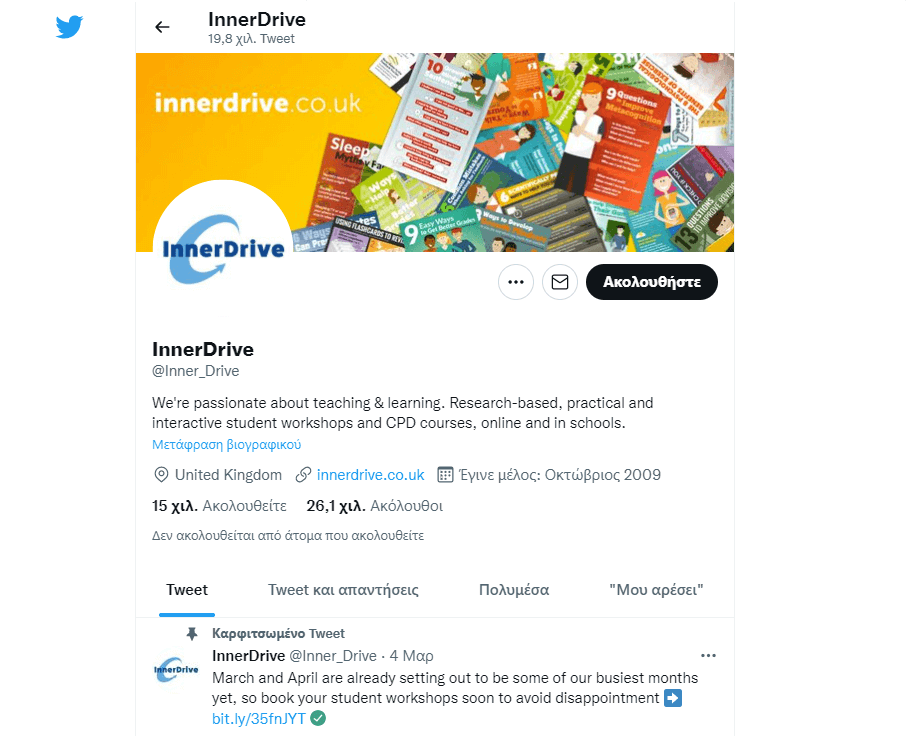
A screenshot of InnerDrive Online Academy Twitter profile.
Show testimonials: people trust other people. If your first client is happy with your service, they won’t mind saying something positive about the coaching you provide. Testimonials are the backbone of your business and you can use them as user-generated content on your website and social platforms.
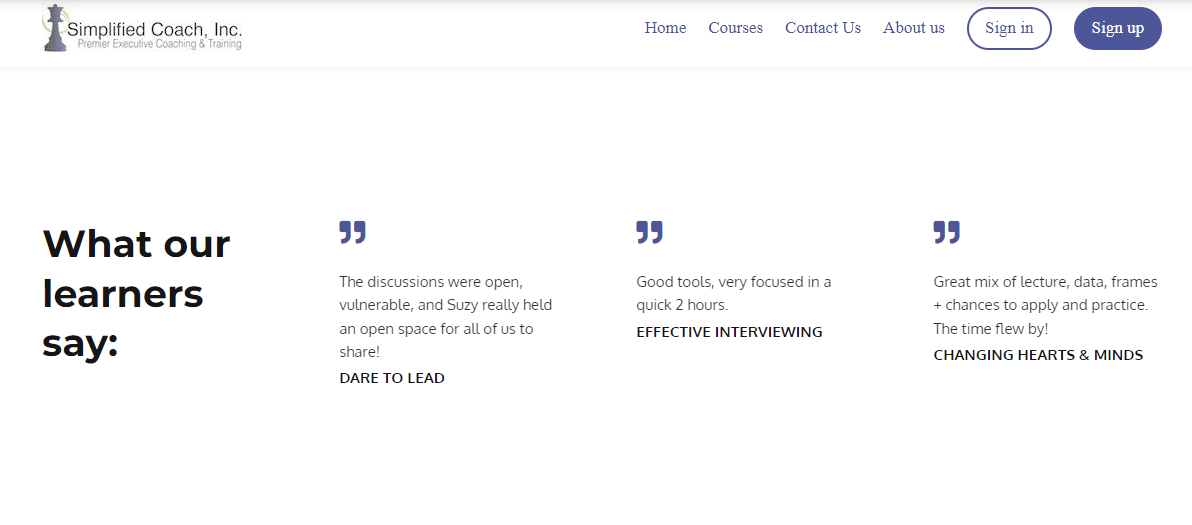
Examples of testimonials that you can use on your website. Screenshot from Simplified Coach, Inc.
For all of this to take place under one roof though, you will need an online training platform like LearnWorlds that will allow you to offer professional coaching effectively.
Step #4: Choose an online training platform
Let’s be clear about something here: You are not a life coach until you start coaching clients and charging them for it.
If you are choosing the digital path to life coaching which is recommended since everybody is going digital, then an online training platform that can offer your coaching courses – like LearnWorlds, is the best fit for you.
Once you are here, check out LearnWorlds features, our pricing, and what you get with the subscription you choose, as these are the most important elements to look for in any online training platform, along with the type and quality of support you can get.
You will discover that LearnWorlds ticks off all of your requirements.
LearnWorlds also enables you to get your online coaching business up and running online and via your own branded Mobile App easily without the need for any technical coding skills.
Leverage the 30-day free trial with LearnWorlds and see for yourself how easy it is to start building your coaching business. Once you are in, you can start building your online coaching academy choosing from a variety of ready-made templates we have prepared for you.
You can start with whichever page you like to build first – your landing page, sales page, testimonial page, the ‘About us’ and ‘Thank you’ page, or any other that serves your business sales funnel.
💁 Explore what LearnWorlds platform can do for your online coaching academy. Check its robust features, functionality and integrations:
Now that you have your coaching business up and running it is time to start preparing your remote coaching programs that will allow you to transmit your knowledge to your audience.
As an online life coach, you don’t need much to start coaching clients.
Since you already have your niche as your course subject, all you need is to start developing your online course.
Here is a straightforward list of what you need to develop your online course:
Create your learning goals: Identify and set the learning objectives that you intend to achieve by the end of the course to set expectations. Do this for every lesson/class you are planning to explore to help your clients learn.
Build your course outline: Plan the curriculum of your course and methodically assign each learning objective to a lesson activity and a quiz or exam at the end.
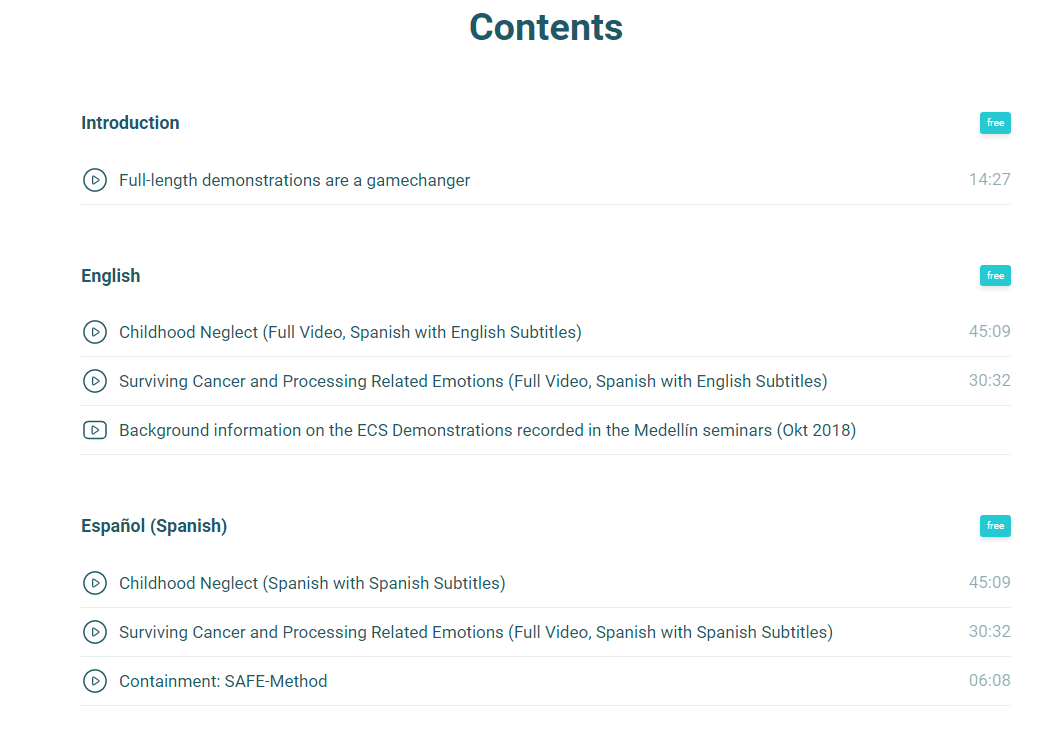 An example of a course outline in a LearnWorlds school
An example of a course outline in a LearnWorlds school
To do this you can use the storyboarding technique that allows you to structure your content in the best way possible.
Create your course content: Draft the content of each lesson or chapter and think about which assessment and grading criteria you can use. To develop your course, you can get the help of an instructional designer, or do it yourself. Option two is easy and less expensive. Alternatively, if you have already developed your course content through either means e.g. through your blog, you can reuse existing content to put your course together.
Upload your course to your LearnWorlds school: Once you have your course content ready, upload it to your LearnWorlds school in the form of PDF, text, audio, video, SCORM, HTML 5, or other learning units using the embedded code.
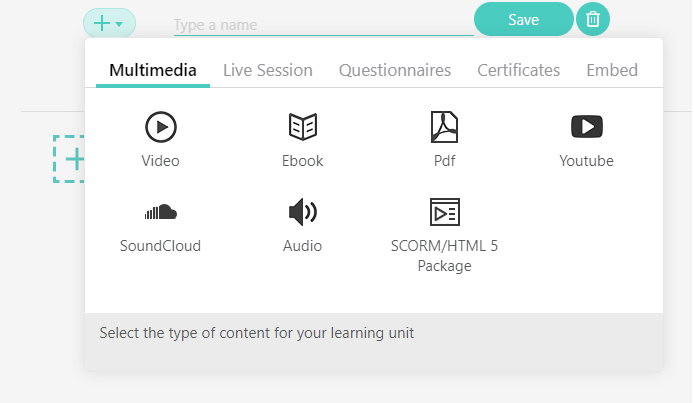
Learning units you can add to your online course.
Don’t forget to create certificates that you can offer to your students once they complete your online course. These are important because they allow you to offer accreditation to your clients and give them an extra incentive to take up your course.
If you need some ideas on certificates, check our guide on how to offer certificates using our ready-to-download templates.
Set up your payment gateway: Once you get your online course up, choose your payment gateway to start accepting payments from your clients. LearnWorlds has several options you can choose from, ranging from Stripe, PayPal, Shopify, PagSeguro, and more local payment gateways.
Start your life coaching practice: Now you are ready to get clients and offer your life coaching services. To do so start investing in marketing your online course and company.
Sounds simple? Well, it is.
Take it from other life coaches who are using LearnWorlds to develop their coaching business. Here are a few examples you can take inspiration from:
EXAMPLE 1: Kaination
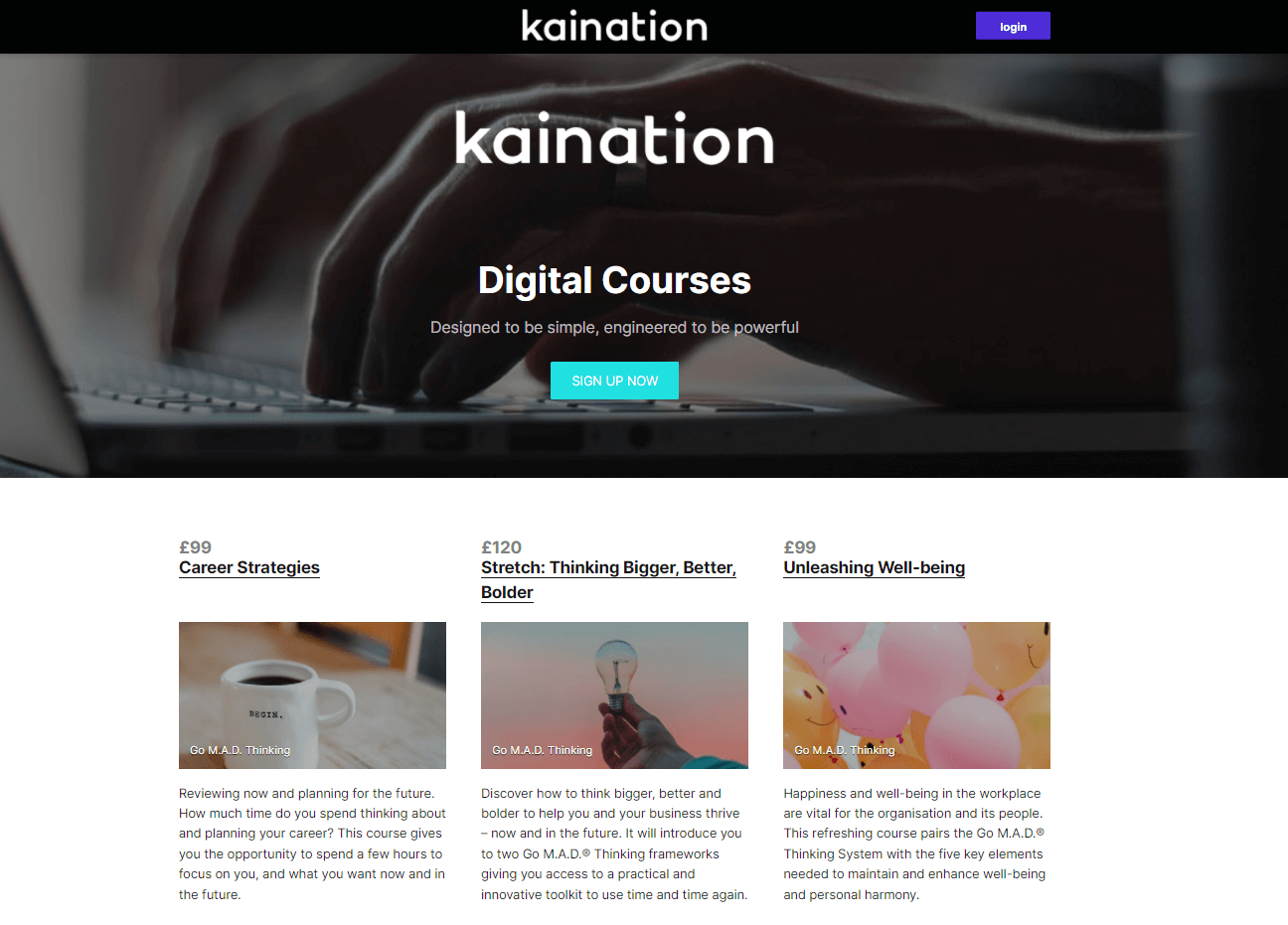
Kaination is a coaching agency dedicated to improving the productivity and effectiveness of organizations around the world by changing the way people think and behave. They have developed a coaching system named “The Go M.A.D.® Thinking System” that they implement in over 40 countries to help people create breakthroughs, achieve their goals, and “Go Make a Difference” in their world.
They offer courses focusing on career strategies, how to think bigger, better, and bolder, and happiness and well-being in the workplace.
They also have a vibrant social media presence on LinkedIn and Twitter, sharing videos, tips, and events.
EXAMPLE 2: Stephanie Harnett
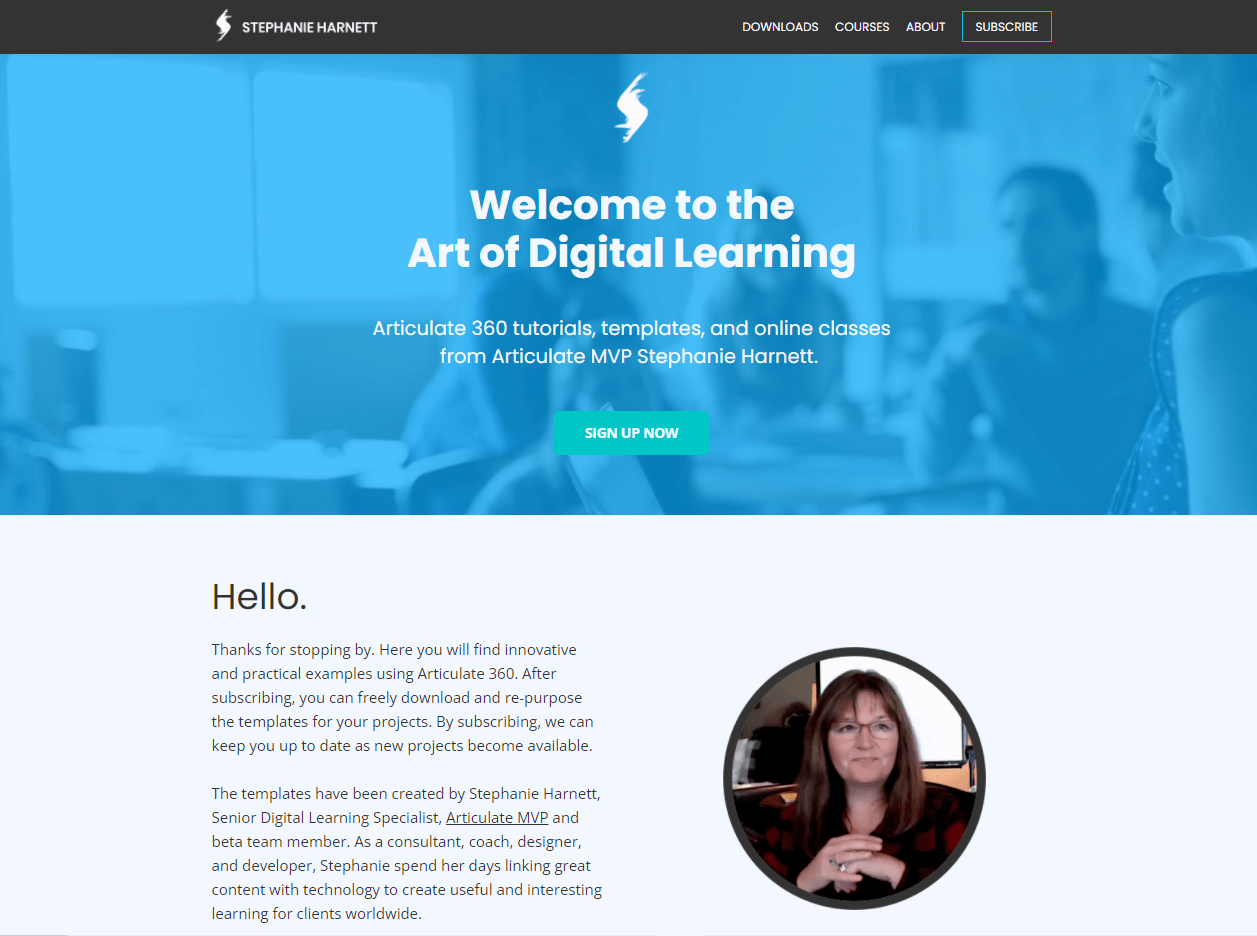
As a consultant, coach, designer, and developer, Stephanie Harnett, spends her days linking great content with technology to create useful and interesting learning for clients worldwide.
Her intent is to help people gain awareness and develop their skills. She believes that meaningful and enjoyable learning experiences can only happen when the student is the focus, so as a consultant and coach, she works with clients to shift their thinking toward the student.
She hosts a comprehensive 4-week online masterclass program to help learning and development professionals master the foundations of creating exceptional online learning and refine it based on student feedback.
Ready, set, coach!
Becoming a virtual life coach is not as difficult or expensive as you may think. In fact, there are many resources available on how to become a life coach online that can help you get started.
💡Before you go make sure you save this handy guide with steps to help you start building your own life coaching programs:
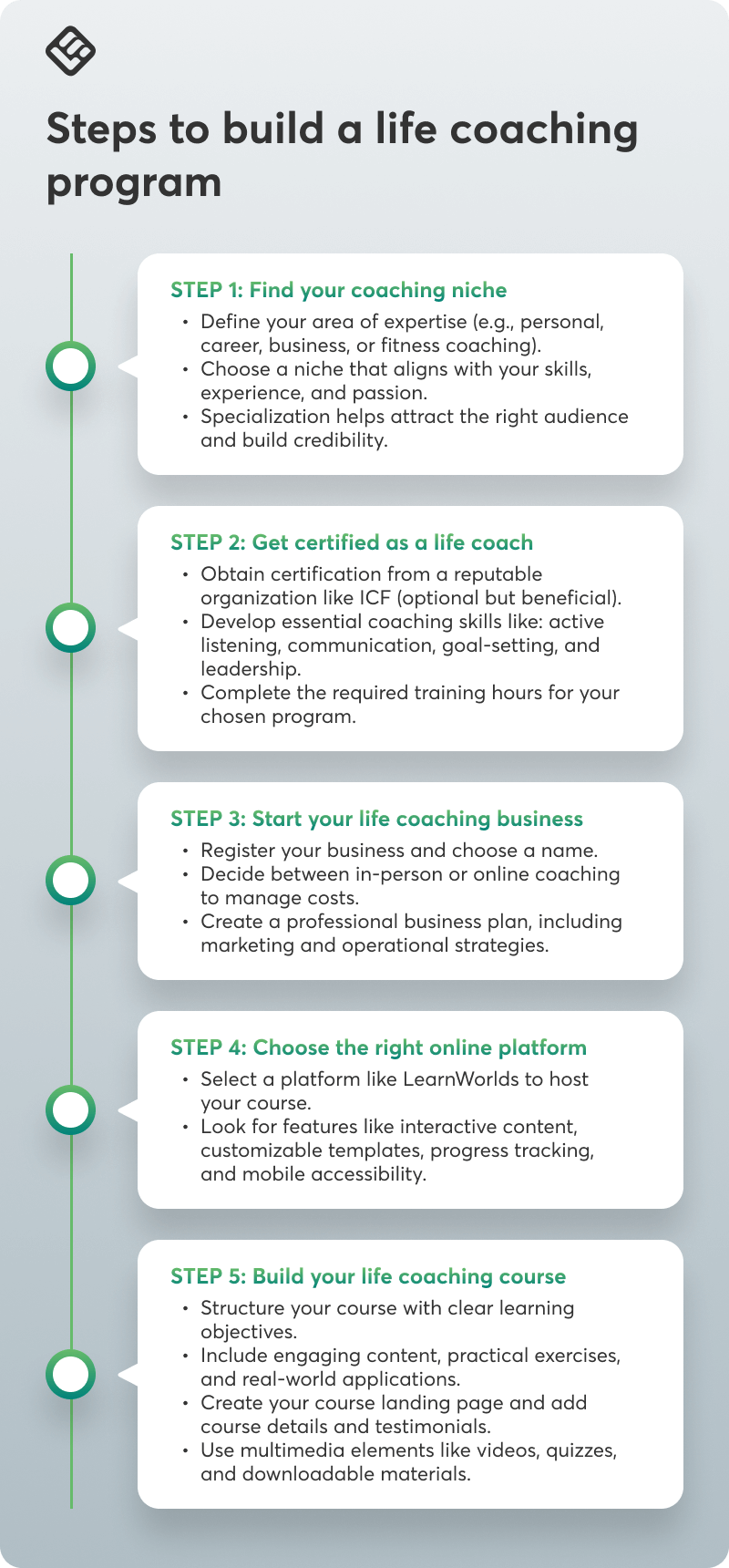
If you are feeling inspired and want to become a professional certified coach, or start developing your coaching program right away, with LearnWorlds, you get all the digital tools you need for virtual life coaching.
Roll up your sleeves and take the first step to becoming a life coach today. We can’t wait to see what you create!
FAQs
How much does it cost to become a life coach?
The cost varies based on the certification program and training you choose.
Certification programs: $1,000–$10,000+ (ICF-accredited programs are typically at the higher end).
Additional costs: Materials, mentorship, or specialization courses may add $500–$2,000. Starting with a budget of $2,000–$5,000 is common for most aspiring life coaches.
How long does it take to become a life coach?
The timeline depends on the type of program and certification you take.
Basic training: 3–6 months for foundational courses.
ICF Certification: 6 months to 2 years, including required practice hours (100–500+). You can start coaching with basic skills in a few months but may take longer for advanced credentials.
How much can you make as a life coach?
Life coach income depends on niche, experience, and client base:
Entry-level coaches: $30,000–$50,000 annually.
Experienced coaches: $60,000–$100,000 or more.
Top-tier or specialized coaches: $150,000+ per year. Coaches often charge $75–$500+ per session, with higher rates for executive or niche coaching.
Further reading you might find interesting:
(Visited 9,168 times, 6 visits today)
Kyriaki is a Content Creator for the LearnWorlds team writing about marketing and e-learning, helping course creators on their journey to create, market, and sell their online courses. Equipped with a degree in Career Guidance, she has a strong background in education management and career success. In her free time, she gets crafty and musical.


